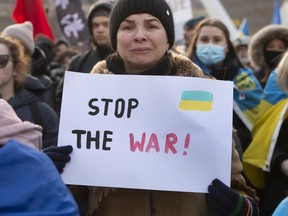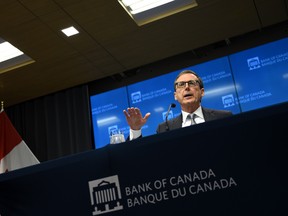Ukraine war won’t stop Bank of Canada from hiking rates, but steep path unlikely

Kevin Carmichael: Hard to believe bank would be aggressive amid the most tense geopolitical backdrop since end of Cold War

Article content
Some people trust markets to predict the future. Those people will have decided that Bank of Canada governor Tiff Macklem is more afraid of the consumer price index than of Russian President Vladimir Putin, who, according to Finance Minister Chrystia Freeland, has cemented his place in “the ranks of the reviled European dictators who caused such carnage in the 20th century.”
Advertisement
Story continues below
This advertisement has not loaded yet, but your article continues below.
Article content
Overnight index swaps are financial assets that investors and traders use to hedge against short-term risk. Therefore their price is tied tightly to short-term interest rates. If you felt you needed such an asset on Feb. 25, you likely would have had to pay a rate that assumed the Bank of Canada will raise interest rates a half-point on March 2, lifting the overnight target to 0.75 per cent from its current emergency setting of 0.25 per cent.
Those prices assume Macklem and his deputies on the Governing Council will be unmoved by a war on the eastern edge of the European Union.
Before Putin ordered an invasion of Ukraine this week, there was a lively debate about whether the Bank of Canada would break from its routine of changing interest rates with incremental quarter-point moves. The consumer price index surged 5.1 per cent in January from a year earlier, the fastest since the central bank committed to keeping headline inflation at around two per cent way back in 1991. The data suggested that the central bank had some catching up to do, hence the bets that Macklem would select a steeper path back to a more normal policy rate.
Advertisement
Story continues below
This advertisement has not loaded yet, but your article continues below.
Article content
Money is often smart, but maybe not this time.
To be sure, the war will put upward pressure on inflation. Russia and Ukraine are big exporters of commodities ranging from oil to wheat, and prices for raw materials predictably jumped on the likelihood of disruptions to supply. The international price of oil is now hovering around US$100 per barrel, compared with around US$80 per barrel when the Bank of Canada completed its most recent economic outlook in mid-January.
The Bank of Canada will certainly raise interest rates next week. It probably should have done so in January, but Macklem decided that would have been too abrupt after promising in the summer of 2020 to leave the benchmark rate near zero until sometime in 2022. He believes forward guidance of that sort is an effective tool and he didn’t want to harm its credibility by reneging on his pledge without first preparing the public for a shift in stance.
Advertisement
Story continues below
This advertisement has not loaded yet, but your article continues below.
Article content
Macklem also said he was wary of raising interest rates amid the uncertainty of the Omicron wave of COVID-19 infections. Large swaths of the economy still were shut due to health restrictions, and an interest-rate increase might have made things worse unnecessarily. The next scheduled opportunity to raise interest rates was less than two months away. A delay of that duration probably wouldn’t make much difference over the longer term.

It’s hard to imagine that a central bank that came to such a conclusion in January would choose to be aggressive amid the most tense geopolitical backdrop since the end of the Cold War. The United States and its allies are talking about freezing Russia out of the international banking system, and they haven’t yet gone after the country’s energy industry with sanctions. The near-term is scarier today than it was in January, when most experts were starting to conclude that Omicron was a lesser threat than previous waves.
Advertisement
Story continues below
This advertisement has not loaded yet, but your article continues below.
Article content
“After the bank’s January decision, where saving face with their forward guidance proved more influential over policy than current inflation conditions, we were among a chorus of analysts calling for a (half-point) hike in March,” Simon Harvey, head of currency analysis at Monex Canada Inc., said in a research note. “The economic backdrop isn’t pressing enough in our view for the bank to change tact and hike rates by more than (a quarter point) for the first time in over twenty years.”
It’s too soon to get a good read on how the war will affect Canada’s economy. Higher commodity prices would be inflationary, both in terms of the added costs for inputs, but also in terms of what they could do to Canadian demand. All things equal, Canada’s oil companies, farmers, and miners will be making more money for goods they would have sold anyway, boosting what economists call the “terms of trade.” A positive shock to the terms of trade will boost economic growth, although slower economic growth as result of the war would offset some of those gains.
Advertisement
Story continues below
This advertisement has not loaded yet, but your article continues below.
Article content
-

The gen-Xers running Canada just got a wakeup call from Putin
-

How war in Ukraine threatens the world’s economic recovery
-

Bank of Canada March interest rate hike a done deal, economists say
-

Tectonic forces are working on the economy that central banks can’t battle alone: Stephen Poloz
The response of the U.S. Federal Reserve also will matter. It is scheduled to decide on interest rates later in March, and Wall Street is pretty sure that the Fed also will be raising borrowing costs, given inflation is even hotter in the United States than it is in Canada. The Fed could do some of Macklem’s work for him, given U.S. interest rates ripple across the world.
Bottom line: there are too many variables to be aggressive on raising interest rates. The Bank of Canada will start down the path, but it will do so tentatively.
“In our opinion, there is no incentive for the BoC to be aggressive at the start of the tightening cycle given the high degree of uncertainty related to supply chain pressures,” Jason Daw and Simon Deeley of RBC Dominion Securities Inc. advised their clients Feb. 25. “A slow approach to start is prudent, with the option to accelerate incremental policy changes later if conditions warrant.”
• Email: kcarmichael@postmedia.com | Twitter: carmichaelkevin
Advertisement
Story continues below
This advertisement has not loaded yet, but your article continues below.









